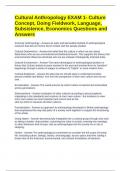-
1. Tentamen (uitwerkingen) - Anthro 102 - intro to anthropology - exam questions with complete solutions
-
2. Tentamen (uitwerkingen) - Anthro exam 1 wvu questions and answers
-
3. Tentamen (uitwerkingen) - Anthropology 1000 exam 1- questions and answers
-
4. Tentamen (uitwerkingen) - Anthropology exam #1 (ch 1-4) questions with correct answers
-
5. Tentamen (uitwerkingen) - Anthropology exam #1- people questions and answers
-
6. Tentamen (uitwerkingen) - Anthropology exam #3 questions with correct answers
-
7. Tentamen (uitwerkingen) - Anthropology exam 1 and 2 review questions and answers
-
8. Tentamen (uitwerkingen) - Anthropology exam 1 archaeology questions and answers
-
9. Tentamen (uitwerkingen) - Anthropology exam 1 key terms and quiz questions with correct answers
-
10. Tentamen (uitwerkingen) - Anthropology exam 1 make up questions and answers
-
11. Tentamen (uitwerkingen) - Anthropology exam 1 multiple choice exam questions and answers
-
12. Tentamen (uitwerkingen) - Anthropology exam 1 questions with correct answers
-
13. Tentamen (uitwerkingen) - Anthropology exam 1 questions with latest update
-
14. Tentamen (uitwerkingen) - Anthropology exam 1 review questions and answers
-
15. Tentamen (uitwerkingen) - Anthropology exam 1 study guide questions and answers
-
16. Tentamen (uitwerkingen) - Anthropology exam 1 study guide questions and answers
-
17. Tentamen (uitwerkingen) - Anthropology exam 1 uark questions with latest update
-
18. Tentamen (uitwerkingen) - Anthropology final exam questions with complete solutions
-
19. Tentamen (uitwerkingen) - Anthropology exam review questions with verified answers
-
20. Tentamen (uitwerkingen) - Anthropology exam review questions with latest update
-
21. Tentamen (uitwerkingen) - Anthropology exam questions with verified answers
-
22. Tentamen (uitwerkingen) - Anthropology exam questions and answers verified answers
-
23. Tentamen (uitwerkingen) - Anthropology exam questions and answers latest update
-
24. Tentamen (uitwerkingen) - Anthropology exam questions and answers latest update
-
25. Tentamen (uitwerkingen) - Anthropology exam material questions and answers
-
26. Tentamen (uitwerkingen) - Anthropology exam chapters 1-5 questions and answers
-
27. Tentamen (uitwerkingen) - Anthropology exam 4 questions with latest update
-
28. Tentamen (uitwerkingen) - Anthropology exam 2 with correct answers
-
29. Tentamen (uitwerkingen) - Anthropology final exam questions with verified answers
-
30. Tentamen (uitwerkingen) - Anthropology midterm exam questions with correct answers
-
31. Tentamen (uitwerkingen) - Anthropology of alcohol exam questions with correct answers
-
32. Tentamen (uitwerkingen) - Anthropology semester 1 exam questions with correct answers
-
33. Tentamen (uitwerkingen) - Anthropology test 1 exam questions with complete solutions
-
34. Tentamen (uitwerkingen) - Anthropology true false exam questions and answers
-
35. Tentamen (uitwerkingen) - Anthropology-exam 5 questions and answers
-
36. Tentamen (uitwerkingen) - Applied anthropology exam questions and answers
-
37. Tentamen (uitwerkingen) - Biological anthropology exam 1 review questions with correct answers
-
38. Tentamen (uitwerkingen) - Chapters 1-4--> exam 1 anthropology questions and answers
-
39. Tentamen (uitwerkingen) - Cultural anthropology - exam questions and answers
-
40. Tentamen (uitwerkingen) - Cultural anthropology exam 1- culture concept, doing fieldwork, language, subsistence...
-
41. Tentamen (uitwerkingen) - Cultural anthropology exam 1 questions and answers
-
42. Tentamen (uitwerkingen) - Cultural anthropology exam 2 questions with correct answers
-
43. Tentamen (uitwerkingen) - Ecu anthropology 1000 exam 1 questions and answers
-
44. Tentamen (uitwerkingen) - Exam 1 chapters 1-4(anthropology) questions and answers
-
45. Tentamen (uitwerkingen) - General anthropology exam #1 questions and answers
-
46. Tentamen (uitwerkingen) - Intro to anthropology - exam 1 questions and answers
-
47. Tentamen (uitwerkingen) - Intro to anthropology final exam questions with complete solutions
-
48. Tentamen (uitwerkingen) - Intro to cultural anthropology exam questions with latest update
-
49. Tentamen (uitwerkingen) - Introduction to biological anthropology exam questions and answers
-
50. Tentamen (uitwerkingen) - Uatk biological anthropology exam questions with latest update
-
51. Tentamen (uitwerkingen) - Social anthropology exam questions and answers
-
52. Tentamen (uitwerkingen) - Physical anthropology exam 1 questions with latest update
-
53. Tentamen (uitwerkingen) - Linguistic anthropology exam 1 questions with complete solutions
-
54. Tentamen (uitwerkingen) - Introduction to cultural anthropology exam questions with latest update
-
Meer zien




